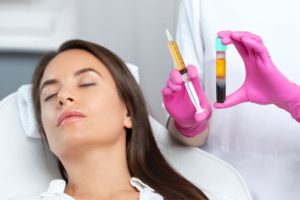Acne-prone skin can be challenging to manage on its own, and when you throw sensitive skin into the mix, your skin can become even more challenging to deal with. It’s hard to determine which issue takes precedence: the breakouts or the sensitivities. Both are skin concerns you’ll likely want to address, and while it can be tricky, you can do so without damaging the skin or making your acne worse. We put together the best Sensitive skin acne treatments for you to choose from.
Clearing up acne-prone skin often requires anti-acne ingredients, including retinol and retinoids, salicylic acid, benzoyl peroxide, and even chemical peels. Some of these ingredients and treatments may do wonders for shrinking breakouts and cleaning out pores, but often, they can be harsh and drying for sensitive skin. As a result, they work but often at the expense of the skin’s health, leaving it red, dry, irritated, or even inflamed. That’s why it’s always best to consult a skin expert who can help you determine the best sensitive skin acne treatments that help.
Some of the best sensitive skin acne treatments don’t come from a bottle or jar but from a professional in a medical setting. Using safe and gentle skin-friendly treatments that employ light or energy may help you find the balance for treating adult acne on sensitive skin.
How do you get rid of acne on sensitive skin?
Skincare experts often assess the skin first to determine what will work best to determine the best acne treatments for sensitive skin. Some of the most effective products for pimples are at-home ones that contain ingredients like salicylic acid and benzoyl peroxide. The key to using these types of acne products on sensitive skin is to avoid overusing them. Lower concentrations are best for dry, sensitive skin.
There are also in-office dermatologist-recommended acne treatments for sensitive skin. One of the newest anti-acne treatments is AviClear. It is the first and only FDA-cleared energy device to treat mild to severe acne. AviClear uses a 1726 nm wavelength to treat the source of acne by suppressing sebaceous gland activity and reducing breakouts.
Is sensitive skin also acne prone?
Unfortunately, your skin can be acne-prone and sensitive, making it hard to treat. Dermatologists recommended acne products that are effective for more sensitive skin, can be natural (think plant-based ingredients and extracts) and contain lower concentrations—you can always work your way up to more substantial concentrations. Sometimes, oral supplements may need to be integrated into a skincare routine for a well-rounded approach that won’t dry out the skin or leave it irritated.
How do I know if my acne is hormonal or bacterial?
Where your breakouts occur and what they look like can help be a clue as to what type of acne you are dealing with. The cause of hormonal acne is a rise or fall in hormone levels; bacterial acne happens when a mix of dead skin, oil, and bacteria clog the pores.
Hormonal acne can result in large, red, painful, cyst-like pimples. Not only is this type of acne caused by fluctuating hormone levels, but medications, pregnancy and postpartum, and even stress can all contribute to hormonal acne, which tends to show up more in adults.
The best acne treatment for hormonal acne often includes soothing ingredients and a mix of effective yet gentle anti-blemish products. If topical products don’t help to clear up your skin, you may require a more robust approach like oral antibiotics or even in-office laser treatments just for acne-prone skin.
What are the best products for pimples?
There are a few types of products that are the best sensitive acne treatments, and you’ll want to have them on hand. The top 3 acne products include:
- An appropriate skin cleanser. Choose creamy and non-drying so that it won’t irritate your skin. Also, check the label for ingredients and ensure that the cleanser contains equal parts, gentle acne ingredients, and hydrating agents. Fragrance-free products are always recommended to use when possible.
- A non-comedogenic moisturizer. Sensitive skin that’s prone to experiencing acne needs gentle hydration in the form of lightweight lotions, gels, and serums. The thicker the product, the more oil it’s likely to contain, making it more likely to clog pores. Avoid anything with butter and heavy oils; instead, pick moisturizing ingredients that are compatible with all skin types—even acne-prone—like hyaluronic acid, for example. Water-based lotions and serums are always a plus. Just like your cleanser, make sure your moisturizer is also fragrance-free.
- Spot treatments: The right types of spot treatments are needed to keep acne in the clear. Both benzoyl peroxide and salicylic acid are effective for acne as long as the concentrations are low enough that they don’t irritate or inflame sensitive skin or cause it to become dry. If your treatment products cause redness or dryness, reduce their frequency of use.
To avoid a flare-up of redness, pimples, or dryness, it’s best to slowly introduce new products into your skincare routine and use small amounts on the skin as instructed.
Does acne prone skin need hydration?
Yes! All skin types need hydration, including those that break out with pimples. Therefore, it’s best to use a gentle, lightweight moisturizer on sensitive acne-prone skin that contains hydrating ingredients like glycerin, hyaluronic acid, and ceramides and anti-inflammatory ingredients like green tea or aloe. In addition, non-comedogenic moisturizers are one of the best acne treatments for dry, sensitive skin. They provide much-need nourishment so that the skin can function correctly.
Treating acne prone skin that’s also sensitive with some anti-acne ingredients can cause dryness, redness, and flaking skin. However, it’s also important not to overdo it with acne ingredients—drying out the skin can make it more prone to future breakouts.
How to protect sensitive skin from acne?
Like other skin types, sensitive skin with acne can quickly become compromised, leading to damage from environmental factors, pollution, and the sun. When sensitive skin with acne becomes inflamed and damaged, it often shows signs of burning, redness, itching, and extreme sensitivity.
The best way to protect sensitive skin with acne is to protect it from free radical damage and sun damage with antioxidants and daily use of sunscreen.









